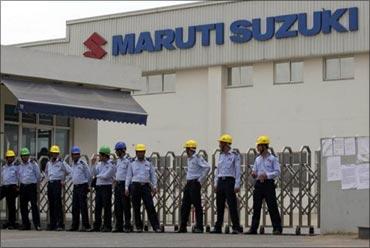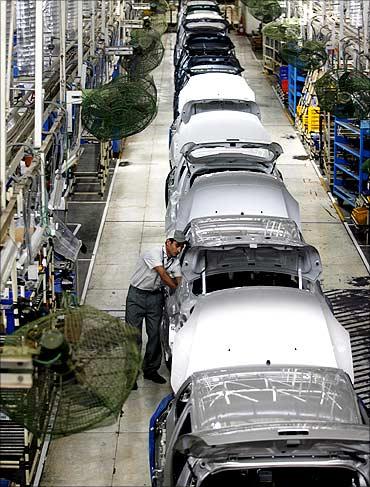Photographs: Reuters Business Standard
Tamil Nadu, claiming to be the Detroit of India, has labour unrest in the automobile industry, among others.
Among the allegations are that companies exploit contract workers.
The industry has a different view.
In an interaction with Business Standard, some answers to these queries from R Sethuraman, senior vice-president, finance and corporate affairs, Hyundai Motor India Ltd.
Edited excerpts:
Tell us your view on the recent labour unrest in the automobile industry, especially on Maruti's Manesar plant.
All we can say is that the turn of events has been most unfortunate.
Violence can never be justified, no matter how grave the dispute.
A solution could have been arrived at through dialogue.
. . .
'Labour law reforms have lagged auto sector growth'
Image: Private security guards outside the Manesar plant.Photographs: Adnan Abidi/Reuters
Is it time for labour law reforms? What would be Hyundai's recommendations?
Yes, the laws need urgent reforms.
Government should facilitate conducive industrial environment by maintaining law and order and supporting industries against disruptive forces.
It might help if they do not impose the recognition of politically backed unions, which induce industrial turbulence.
Rather, they should support a union which is balanced and ensures a healthy work culture.
We suggest the employers have flexibility to fix working hours with commensurate wages.
Self-certification methods have to be permitted wherever external certification is sought under the Act, with no dilution of existing statutory norms.
. . .
'Labour law reforms have lagged auto sector growth'
Image: A car manufacturing unit.Photographs: Reuters
For example, to carry out the medical examination, authority should be given to the Factory Medical Officer instead of a Certifying Surgeon appointed by the government, because of scarcity in the number of the latter.
The enforcing authority should guide/suggest improvement of working conditions and safety measures at the work place to employers.
The minimum workforce strength required for the registration of a trade union should be amended from the current 10 per cent to 30 per cent.
De-recognise militant unions and also make it mandatory to deduct the union subscription fee directly from the salary and remit it to the union.
. . .
'Labour law reforms have lagged auto sector growth'
Photographs: Reuters
Labour unrest keeps coming up. What are the triggers?
The Indian automobile industry has progressed at a rapid pace over the past two decades, but reforms in the labour laws have not kept pace.
Permanent workers earn well and lead comfortable, modern lifestyles.
At Hyundai, an ITI diploma holder with about 10 years' experience would take home anything Rs 42-45,000 a month.
At times, they get carried away by vested interests who are politically connected and get manipulated.
These instigate workers to agitate on trivial issues which can be resolved through discussion.
Once these elements lose the backing of their political mentors, their support to workers weaken, which is when the workforce realises its folly, which leads to frustration.
. . .
'Labour law reforms have lagged auto sector growth'
Often, contract workers get trapped between the management and the unions (usually of permanent employees) when the latter decide to protest. What is your view on it?
At Hyundai, we do not employ contract labour on core manufacturing functions.
We employed them in functions like material handling, drivers of finished cars taken to pre-delivery inspection areas, housekeeping, security and the like.
Hence, we cannot compare the two groups, as the nature of their jobs is very different.
. . .
'Labour law reforms have lagged auto sector growth'
What are the rights of these workers, according to the law?
At Hyundai, we employ contract workers through reputed firms.
These workers are governed by the rules and regulations of the firm they are employed with.
All our contractors comply with statutory norms as prescribed under the law.
Could you share some details like how much contract workers earn in Hyundai and their medical benefits? In the last five years, by what percentage has their salary increased vis-a-vis inflation? How secure are their jobs? How skilled and qualified are these workers?
The nature of work of a contract worker is different and, hence, there cannot be parity in salary.
Hyundai does not engage contract workers directly but through reputed firms like TVS.
A contract worker's CTC (cost-to-company) is Rs 14,000 a month and he is entitled to all statutory benefits.
. . .
'Labour law reforms have lagged auto sector growth'
How many people are working in the Hyundai factory? Of this, what percentage will be contract workers?
We employ a little over 5,000 permanent workers, consisting of trainees and apprentices, in core production areas.
Contract workers are about 3,000.
Of these, 1,110 are connected to production functions like material handling, drivers used for shuttling finished cars, etc.
The rest are employed in housekeeping, canteens, security, logistics, etc.









article